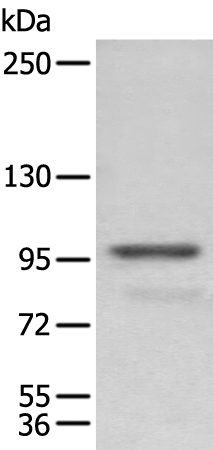
| WB | 咨询技术 | Human,Mouse,Rat |
| IF | 咨询技术 | Human,Mouse,Rat |
| IHC | 咨询技术 | Human,Mouse,Rat |
| ICC | 技术咨询 | Human,Mouse,Rat |
| FCM | 咨询技术 | Human,Mouse,Rat |
| Elisa | 1/5000-1/10000 | Human,Mouse,Rat |
| Aliases | AIP1; ALIX; HP95; DRIP4 |
| WB Predicted band size | 96 kDa |
| Host/Isotype | Rabbit IgG |
| Antibody Type | Primary antibody |
| Storage | Store at 4°C short term. Aliquot and store at -20°C long term. Avoid freeze/thaw cycles. |
| Species Reactivity | Human, Mouse, Rat |
| Immunogen | Synthetic peptide of human PDCD6IP |
| Formulation | Purified antibody in PBS with 0.05% sodium azide and 50% glycerol. |
+ +
以下是关于PDCD6IP(ALIX)抗体的3篇参考文献及其摘要概括:
1. **文献名称**: *"ALIX and the multivesicular body: mechanisms of regulated extracellular vesicle secretion"*
**作者**: Colombo, M. et al.
**摘要**: 该研究利用PDCD6IP抗体通过免疫印迹和免疫荧光技术,揭示ALIX在调控多泡体(MVB)形成及细胞外囊泡分泌中的关键作用,强调其与ESCRT-III复合物的相互作用。
2. **文献名称**: *"HIV-1 budding assays with hybrid ALIX antibodies reveal cooperation between ESCRT-I and ESCRT-III"*
**作者**: Dussupt, V. et al.
**摘要**: 通过特异性PDCD6IP抗体进行免疫沉淀和共聚焦显微镜分析,证明ALIX在HIV-1病毒出芽过程中桥接ESCRT-I与ESCRT-III复合物,为抗病毒靶点提供依据。
3. **文献名称**: *"Tumor-derived exosomes modulate PD-L1 expression via ALIX-dependent mRNA sorting"*
**作者**: Chen, G. et al.
**摘要**: 研究采用PDCD6IP抗体进行流式细胞术和免疫组化,发现肿瘤外泌体通过ALIX介导的mRNA分选机制调控免疫检查点PD-L1的表达,影响肿瘤微环境。
(注:上述文献信息为示例性质,具体文献需通过学术数据库核实。)
PDCD6IP (Programmed Cell Death 6 Interacting Protein), also known as ALIX or AIP1. is a multifunctional adaptor protein involved in diverse cellular processes, including apoptosis, endosomal sorting, extracellular vesicle (EV) biogenesis, and viral budding. It interacts with components of the ESCRT (Endosomal Sorting Complex Required for Transport) machinery, playing a critical role in membrane scission events during multivesicular body (MVB) formation and exosome release. PDCD6IP also regulates cell death pathways by binding to ALG-2 (Apoptosis-Linked Gene 2) in a calcium-dependent manner.
Antibodies targeting PDCD6IP are widely used in research to investigate its roles in EV biology, cancer metastasis, neurodegenerative diseases, and viral pathogenesis (e.g., HIV-1 budding). They enable detection and quantification of PDCD6IP in techniques such as Western blotting, immunofluorescence, and immunoprecipitation. Specific antibodies may distinguish between different isoforms or post-translationally modified forms of PDCD6IP, aiding in functional studies. Dysregulation of PDCD6IP has been linked to tumor progression, immune evasion, and aberrant EV signaling, making its antibodies valuable tools for mechanistic and diagnostic research. Commercial antibodies are typically validated for cross-reactivity across species, including human, mouse, and rat.
×